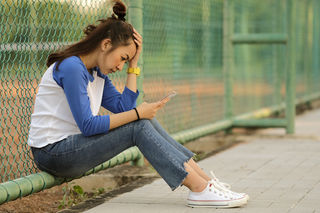Media
Why Ghosting Is Leading the World's Mental Health Crisis
Responsible use of social media is key to learning empathy.
Posted October 6, 2017

Ghosting. Simmering. Icing. I recently learned about these terms in the context of personal relationships. If you have spent any time online, you most likely know them as well. Essentially, the terms mean to ignore someone’s messages. Whether it's a text, voice message, or email, ghosting means to not respond, or disappear. Somehow, it has become common practice, and is almost considered socially acceptable. It makes people feel bad when they're on the receiving end, and yet others do it with virtually no consequence, at least not in real time. When you ghost, you don't have to see the person's pain.
The threshold for rudeness has been lowered considerably, as people ignore others in the name of being "too busy."
According to an April 2017 report drawn from a survey by the U.S. Centers for Disease Control and Prevention, an estimated 8.3 million American adults, or 3.4 percent of the population, suffer from serious psychological distress including anxiety, depression, and stress. While some point to economic factors as the origin of this collective pain, I would suggest that other variables have added to our failing well-being as well.
Consider that 2007 marked the introduction of the iPhone. Social media became a much larger platform of expression, as people could carry their social lives in the palm of their hand. Texting was no longer novel, and it became easier to type — and ignore — messages. The rise of outlets like Snapchat offers a great example of the potential for heartless engagement. It is almost as if an individual's social life has become a video game. According to NHS data in the UK, social media is a large component of poor mental health among girls age 17 and under. Online activity has become a feeding ground for sadness, discontent, and plummeting self-esteem.
The influence of social media is only growing: According to marketing agency MediaKix, the average Internet user will spend 5 years and 4 months of his or her life on social media, but only 1 year and 3 months socializing in person.
I'm not a technophobe; in fact, I use social media every day. It is how I make my living. Used properly, it has great value if we use it properly. But I have noticed a rapidly growing trend of disconnection while feeding into our inherent need as human beings to connect. In short, we are connecting with machines, not the people using them.
Note to Self podcaster Manoush Zomorodi recently discussed our obsession with our phones with pscychotherapist and author Esther Perel. Perel’s advice was the same I would give: Take five minutes out of your day to call someone you care about. Don’t text. Don’t inbox a message. Speak to the person — no one in distress would ever say, "Damn, I wish you hadn’t called."
- Make a list of people you've ghosted, and clean up the mess. It will lead to less distress — both for you and the person affected.
- Regain control of your social media usage. If you see something interesting from a friend on Facebook, ask that person to meet for coffee to discuss it further. In other words, use Facebook to inform what you will talk about in person or on the phone
- Look people in the eye. Practice at the check-out counter. When completing your transaction, look at the clerk directly. Say, "Thank you.“ And smile.
- Put away your phone more than usual. Start slowly, such as leaving it outside the bathroom when you go inside.
- Create gadget-free zones. Mine is the kitchen table. Food, beverages, and conversation belong there. Not iAnythingElse.
- The best way to teach empathy is to be empathetic. Actions speak volumes. Words — especially at 140 characters — do not.
In a November 2016 Philadelphia magazine article, "How We Became Me," Sandy Hingston bemoaned the decrease in civic activity and our growing lack of exposure to people who don’t think as we do. We used to engage in sports, scouting, church events, and the like, which required a higher level of tolerance among various groups of people. Today, however, we construct online networks of like-minded people. As a result, our ability to tolerate different mentalities is shrinking.
It is easy to lock ourselves away in an online bubble. But human connection relies on real human beings. Using social media responsibly is an important step in making us feel better about ourselves and our surroundings: How will you spend your time today?


